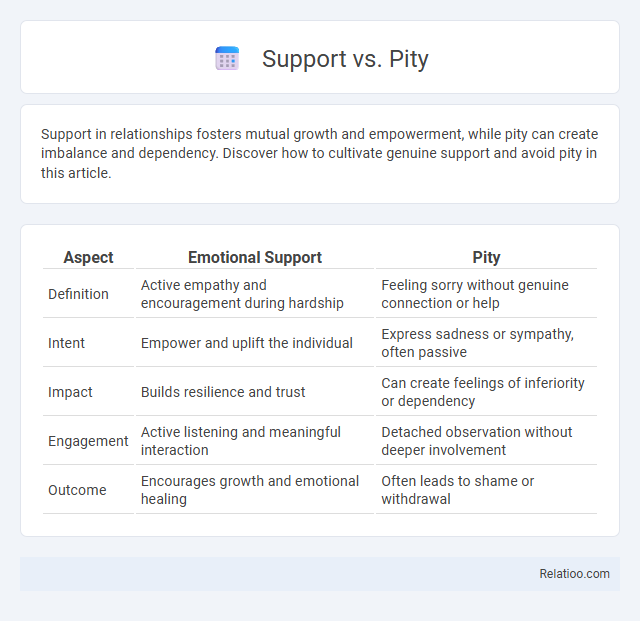Support in relationships fosters mutual growth and empowerment, while pity can create imbalance and dependency. Discover how to cultivate genuine support and avoid pity in this article.
Table of Comparison
| Aspect | Emotional Support | Pity |
|---|---|---|
| Definition | Active empathy and encouragement during hardship | Feeling sorry without genuine connection or help |
| Intent | Empower and uplift the individual | Express sadness or sympathy, often passive |
| Impact | Builds resilience and trust | Can create feelings of inferiority or dependency |
| Engagement | Active listening and meaningful interaction | Detached observation without deeper involvement |
| Outcome | Encourages growth and emotional healing | Often leads to shame or withdrawal |
Defining Support and Pity: Key Differences
Support involves actively providing help, encouragement, or resources to empower individuals facing challenges, fostering resilience and autonomy. Pity, in contrast, often conveys a sense of sorrow or sympathy that can feel condescending or disempowering, emphasizing an imbalance between the helper and the recipient. Understanding these key differences highlights how support strengthens connections through empathy and action, while pity risks creating distance by emphasizing vulnerability without engagement.
The Psychology Behind Support
Support in psychology involves active empathy and constructive assistance that empowers individuals to overcome challenges, contrasting with pity which often conveys a sense of inferiority and detachment. Solidarity fosters a shared identity and collective action, enhancing resilience through mutual understanding and cooperation. Effective support leverages emotional validation and practical help, promoting psychological well-being and autonomy rather than passive sympathy.
Understanding the Roots of Pity
Support fosters empowerment by addressing specific needs, while pity often stems from a sense of superiority and misunderstanding of another's situation. Understanding the roots of pity reveals its basis in discomfort and distance rather than genuine empathy, which can hinder meaningful connection. Your ability to distinguish between these feelings allows for deeper solidarity, promoting respect and shared experience.
Emotional Impact: Support vs Pity on Wellbeing
Support fosters empowerment and resilience by validating emotions and encouraging growth, enhancing overall wellbeing and self-esteem. Pity often induces feelings of helplessness and dependence, potentially diminishing confidence and exacerbating emotional distress. Solidarity reinforces a sense of belonging and collective strength, further promoting mental health and emotional stability.
How Support Empowers Individuals
Support empowers individuals by fostering resilience and encouraging proactive problem-solving, enabling them to regain control over their circumstances. Unlike pity, which can create dependency and undermine self-esteem, genuine support promotes autonomy and personal strength. Solidarity strengthens this empowerment by building a shared sense of purpose and collective action, amplifying individual efforts through community connection.
The Disempowering Effects of Pity
Pity often reinforces feelings of inferiority by framing those in need as helpless or less capable, which can undermine their confidence and autonomy. Unlike support or solidarity, which empower individuals by recognizing their strength and fostering mutual respect, pity creates a power imbalance that disempowers rather than uplifts. Your approach should focus on solidarity, promoting equality and shared experience to foster true empowerment instead of perpetuating dependency.
Recognizing Supportive vs Pitying Behaviors
Recognizing supportive behaviors involves noticing genuine empathy, active listening, and offering help without judgment, which fosters your strength and autonomy. Pity, in contrast, often manifests as condescending attitudes or well-meaning but disempowering remarks, highlighting perceived weakness rather than resilience. Solidarity goes beyond support by standing alongside you, sharing experiences and advocating collectively for change.
Language Matters: Communicating Support, Not Pity
Communicating support rather than pity involves using empowering language that respects individual autonomy and promotes dignity. Phrases emphasizing understanding, encouragement, and shared experience foster solidarity, creating a connection grounded in empathy rather than condescension. Language that highlights strengths and resilience rather than weakness is crucial for nurturing genuine support and meaningful solidarity.
Cultivating a Culture of Support
Cultivating a culture of support involves fostering genuine connections that empower individuals rather than create dependence, distinguishing it clearly from pity, which often reinforces a sense of helplessness. Solidarity strengthens this culture by uniting people through shared goals and mutual respect, encouraging active participation and collective growth. Your role is to engage authentically, offering encouragement that uplifts others and builds resilient communities rooted in empathy and collaboration.
Moving from Pity to Genuine Support
Moving from pity to genuine support involves recognizing the dignity and agency of those you wish to help, rather than viewing them as helpless or inferior. Genuine support focuses on empowerment, offering resources and encouragement that enable individuals to overcome challenges on their own terms. Your role shifts from passive sympathy to active partnership, fostering resilience and mutual respect.

Infographic: Support vs Pity
 relatioo.com
relatioo.com